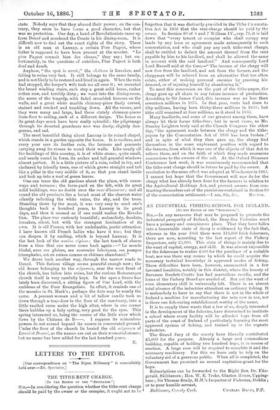LETTERS TO THE EDITOR.
[Our correspondence on "The Ripon Millenary" is unavoidably -held over.—ED. Spectator.] THE TITHE-RENT CHARGE.
TO THE EDITOR OF THY "SPECTATOR".]
SLR,—In considering the question whether the tithe-rent charge should be paid by the owner or the occupier, it ought not to be forgotten that it was distinctly pro7ided in the Tithe Commuta- tion Act in 1836 that the rent-charge should be paid by the owner. In Section 80 of 6 and 7 William IV., cap. 71, it is laid down that "every tenant or occupier who shall occupy any lands by any lease or agreement made subsequently to such commutation, and who shall pay any such tithe-rent charge, shall be entitled to deduct the amount thereof from the rent payable by him to his landlord, and shall be allowed the same in account with the said landlord." And consequently Lord Lord Russell said at the time,—" The income of the clergy will now flow from the landlord, and not from the farmer, and the clergyman will be relieved from an alternative that too often exists, either of making personal enemies by pressing his demand, or of injuring himself by abandoning it."
To meet this concession on the part of the tithe-payer, the clergy gave up all share in any future increase of production. According to Sir James Caird, this increase was no less than seventeen millions in 1876. In that year, rents had risen to fifty millions, having been thirty-three millions in 1836; bat tithe still remained at four millions, as it stood in 1836.
Many landlords, and some of our greatest among them, have always let their farms tithe-free ; but in most cases, as Mr. Stanley Leighton truly said at the Church Congress the other day, "the agreement made between the clergy and the tithe- payers by the Commutation Act of 1836 has been broken ;" and in spite of what they then gave up, the clergy find themselves in the same unpleasant position with regard to the farmers, from which it was one of the objects of that Act to relieve them, and on the faith of which they made enormous concessions to the owners of the soil. At the Oxford Diocesan Conference last week, it was unanimously recommended that the tithe-rent charge should in future be paid by the owner. A resolution to the same effect was adopted at Winchester in 1883. I cannot but hope that the Government will now do for the clergy what has already been done for the farmers in relation to the Agricultural Holdings Act, and prevent owners from con- tracting themselves out of the provisions contained in Section 80 of the commutation settlement.—I am, Sir, &c., RECTOR.


































 Previous page
Previous page